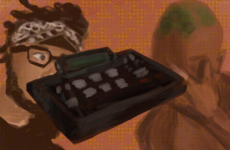From as early as elementary school, American children are taught to stand for the national anthem. Placing a hand over one’s heart and bowing one’s head have long been synonymous with showing respect for the American flag and demonstrating that one agrees with what it and the United States stand for. Therefore, when San Francisco 49ers quarterback Colin Kaepernick decided that he did not agree with some of the practices the American flag has come to symbolize, namely police brutality and prejudice against black people in America, he also decided that he would no longer stand for the national anthem. Kaepernick’s seemingly simple and personal decision soon resulted in everything from outrage to praise as Americans everywhere weighed in on his actions. In reality, Kaepernick was simply using his power and influence to call attention to an issue that lawmakers have continued to ignore: police brutality and racial discrimination against minorities.
Kaepernick’s protests come on the heels of a huge increase in demonstrations by the Black Lives Matter Movement and other groups fighting police brutality against African-Americans. Multiple unjust killings this summer, such as that of Philando Castile and Alton Sterling, further show that the issue of racial prejudice in American law-enforcement desperately needs to be addressed. Though millions of people have demonstrated their frustration and anger with the law-enforcement system, the government has yet to take adequate action to solve this problem. In 2015 alone, almost 1,200 people were killed by the police, and about half of them were minorities, according to open-sourced reporting project “Killed by Police.” However, too few police have been convicted of murder or misconduct as the result of any of those killings. These statistics once again confirm that racism and discrimination are rampant among police officers and other law-enforcement officials. By refusing to stand for the national anthem and calling for change, Kaepernick shined a light on an issue that legislators continue to ignore.
Many solutions have been proposed to put an end to the unjust police murders of minorities. Many have called for a law requiring police to wear body-cameras at all times, so that in the event of a fatal situation, video evidence would be available to be examined. This has been implemented in some districts across the nation and has proved helpful in cases like the murder of Alton Sterling, where body-camera footage enabled lawyers to review the actions of the police officer in question and either corroborate or disprove his story. Implementing a federal law that mandates the wearing of body cameras would have allowed clarity in many other questionable deaths – such as that of Michael Brown – and may have resulted in justice in cases where police officers were not convicted because of unreliable evidence. Despite body cameras having been proven effective in districts where they were implemented, the federal government still has not taken any legislative action. It is necessary for the federal government to take action to prevent further killings.
Ultimately, Kaepernick has succeeded in his goal of calling attention to the unjust police brutality in the United States. However, making headlines and simply talking can only do so much. It is now up to the national government to make changes and implement legislation that will save hundreds of lives each year while deconstructing the growing racial divide in the United States. If other celebrities and the general population join in these protests and help call attention to the issue of racial prejudice in the law-enforcement system, they can help pressure the government and prevent more unnecessary killings. It is our duty as American citizens to demand change when our government refuses to act, and until legislators make the necessary changes, protests like Colin Kaepernick’s will remain vital in this struggle.




